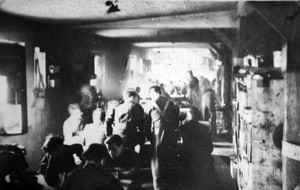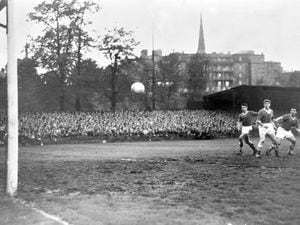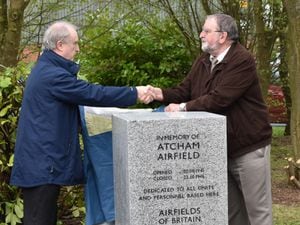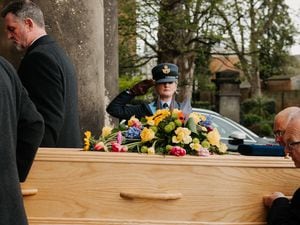Discovery of John's prison camp diaries tell harrowing tale
As Tony Kingston helped clear the Shropshire house of his in-laws, he came across an old battered leather suitcase in the attic. Inside were extraordinary things.

They included a series of diaries written in great secrecy and in conditions of hardship by Spitfire pilot John Shanks during his time as a prisoner-of-war.
During nearly three years in captivity, he successfully kept those precious diaries hidden from the German guards. He carried them with him all through the notorious Long March of 1945 during which he came close to death. And he was eventually able to bring them home as a remarkable and detailed record of his experiences.
Yet until after his death his family had no idea they had even existed.
That suitcase, discovered in October last year as the house in Albrighton was being put on the market, also included remarkable photos taken in the prison camp, letters, maps, telegrams and other documents from the wartime days.
Since then John's daughter Jeni Kingston, Tony's wife, has been busy painstakingly transcribing the diaries with the aid of a magnifying glass – her father's handwriting in the pocket notebooks is tiny – and going through the material.
Its value as a historic record has been obvious to her. These were not hurried minimal jottings, but detailed and often daily entries recording life in the camp.
"I will definitely give it to a museum, the question is which one. They are fascinating," she said.
"I knew that he had been in a prisoner-of-war camp. I didn't know he had been in Lamsdorf."
Lamsdorf, or Lambinowice, as it is now called, was the site of Stalag VIIIb. One of Jeni's challenges has been that many places John mentions are now known by different names. Another is that when she has queries about diary entries, documents, or photos, he is of course no longer here to ask about them.
Jeni, who is 60 and lives near Albrighton, would like to scan the diaries and donate the scans to the museum at Lamsdorf. She is also thinking of putting the information online.
"A lot of people might be interested, especially those who may have had relatives in Lamsdorf. He does mention quite a few names of people in Lamsdorf with him. If people can identify their own relatives, that would be quite interesting for them and also to see what the conditions were like."
She says her father very rarely spoke about those times.
Her brother Murray Shanks said: "It was only because he didn't think we would be interested. When my daughter Leonie interviewed him for a project in 1995, he was very open."
In September Jeni and Murray went on a pilgrimage to the site of the prison camp, which during the war was in Germany, but under redrawn borders is now in Poland.
"It was really fascinating," she said.
Their visit was as part of an organised tour, and she reflects that there was a missed opportunity in past years to persuade her father to return.
"It's just a shame we didn't get to do that."
Born on July 20, 1921, John lived at The Hollies Farm, Pattingham, and went to Wolverhampton Grammar School. When war broke out, he was determined to do his bit, even though as a farmer's son he could have been exempt, and at the age of 17 lied about his age to sign up for the RAF.
He became an instructor, and his service included seven months at RAF Tern Hill.
It may have been while there that he decided to play a trick on his mum, flying really low over the farm at Pattingham, making it look like he was going to crash into the barn, before swerving clear at the last minute.
According to his story he forgot about the pupil who was in a following aircraft, who tried to copy him, and really did crash into the barn.
However Jeni says: "I have never seen damage on the barn caused by an aircraft. It might have been skimming it. Probably he was being a bit facetious. He liked to make the kids laugh."
On another occasion he hit a tree while low flying and was reprimanded.
John, who was nicknamed Hank during his RAF days although it didn't stick after the war, was itching to get into action, but as an instructor opportunities were few.
"He was allowed to go on Operation Jubilee, the Dieppe raid in 1942. He was thrilled."
Serving in 124 Squadron he took part in the air battles flying a Spitfire. But his war came to an abrupt end. During his second sortie that day, he attacked a German Dornier 217E bomber at low level.
"It jettisoned its bombs, which ricocheted up into dad's fuselage, and he had to crash land," says Jeni. This is how the family has always understood the story, and indeed the letter to his parents from his commanding officer Squadron Leader Tom Balmforth talks about his plane being damaged by the shrapnel of bombs jettisoned at low altitude.
However, John's diary does not specifically say his plane was damaged by the exploding bombs, only that shortly after his attack his Spitfire had engine failure. In any event, he force landed in France on August 19, 1942.
At first, he headed for the coast, hoping to be picked up, and then decided to walk to Spain, but didn't get very far, being caught by the Germans.
"He tried to pretend he was French. But his French was too poor," said Jeni.
And so began his long period in captivity, in which he ended up at Lamsdorf. While captivity was tough enough, it could have been even tougher, as luckily for him he was not used as forced labour.
At the time of his capture he had the rank of Sergeant, but later became a Flight Lieutenant.
To fill the time he learned bridge, which became a lifelong passion, read a lot, took part in various sports, and secretly wrote his diaries.
"A lot of them got very very bored. That was very difficult for them. I think dad kept himself quite chipper, although there are very bleak and dark references in his diaries," said Jeni.
They even had lectures, including, rather bizarrely, a talk about polygamy.
"The Red Cross kept him alive, basically. The diet they were expected to live on from the Germans was very poor and sub-starvation. Even with the food parcel supplements he got a lot of illness. He had several colds during the very cold winters and a lot of problems with his teeth and mouth ulcers."
Murray said: "He was completely obsessed by food. He said that when he got home he was going to spend a lot of time cooking. But I don't think he ever cooked a meal in his life – I don't remember him ever cooking anything for us."
Writing the illicit diaries was in itself a risky business.
Jeni says: "He does mention there being a spot search. They were all brought out on the parade ground. The Gestapo were going through all the barracks. He said he was very lucky. He went from the non-inspected group to the inspected group so his diaries could be still hidden. They were on his person. I think mainly he buried them."
The worst came at the end of the war when, with the Russians advancing ever closer, the camp was evacuated and John and other prisoners were forced on what became known as The Long March. Prisoners were forced to trek westwards in freezing conditions, with little food, and often trudging through thick snow.
Through all this time John was hanging on to his precious diaries, which were safely packed in his kitbag.
After two weeks in which he walked about 580 kilometres (360 miles) he went down with dysentery, which nearly killed him, and flu. Once he had been 11 stone 13 lbs. His weight tumbled to 7 stone 10 lbs.
On his return to Britain he wanted to return to flying, which he adored, but there were no openings and in any event his eyesight had deteriorated while in the prison camp. Instead he took over the family farm at Pattingham.
Later he and wife Sheila, whom he married in 1952, moved to Albrighton.
He died in October 2014, aged 93.
"Mum went into a care home a year last July, and in the October we decided to put the house on the market, and it was then that my husband found that old battered leather suitcase. We opened it out and found all these diaries.
"My father was a great character. He was a really nice man. When I read the diaries you realise what a moral character he was. He was disgusted by the activities of prisoners of war taking more than their fair share of food and the rackets that went on."





